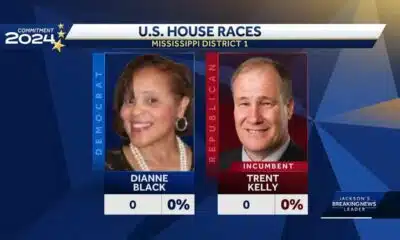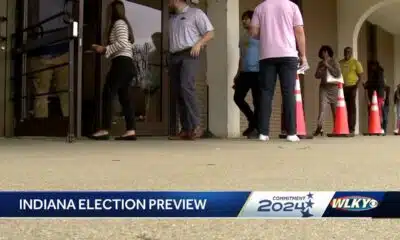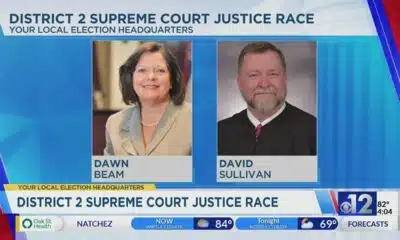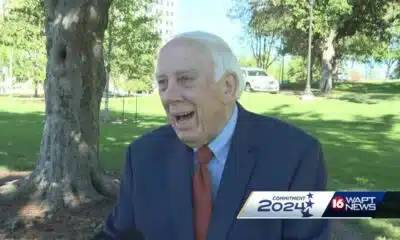Mississippi News
In Mississippi, Christian forgiveness does not equate to felony voting reforms
In Mississippi, Christian forgiveness does not equate to felony voting reforms
As Haley Barbour faced an onslaught of criticism for pardoning dozens of people convicted of felonies as his tenure as governor ended in 2012, he cited his Christian beliefs for his actions.
“Christianity teaches us forgiveness and second chances. I believe in second chances, and I try hard to be forgiving,” the former governor said soon after leaving office of the more than 200 acts of clemency he granted.
During his eight years as governor, Barbour, like most other Mississippi politicians, did nothing to make that forgiveness more inclusive by creating a system that would make it easier for the literally tens of thousands of people convicted of felonies to have their voting rights restored.
Most Mississippi politicians wear their Christianity on their sleeve. The primary tenet of the Christian faith is forgiveness and redemption. Yet, they do not see as part of that forgiveness and redemption the restoration of voting rights for people convicted of felonies.
Multiple studies have made the argument that restoring voting rights increases the odds that people who have been convicted of felonies will become productive members of society.
Dennis Hopkins, a 46-year-old Potts Camp resident who lost his right to vote as a teenager when he was convicted of grand larceny, but is now a productive member of the community in the north Mississippi hamlet, explained to lawmakers the importance of voting.
“Voting to me is everything,” Hopkins said in 2021 during a legislative hearing. “I tell my kids how important the vote is … it shames me to tell them I can’t vote.”
The old adage that the judicial system moves slowly has never been truer than when it comes to Mississippi’s one-in-the-nation system of preventing people convicted of certain felonies from regaining their voting rights.
On Sept. 25, 2021 (more than 10 months ago), the entire panel of the 5th Circuit Court of Appeals heard arguments about whether Mississippi’s felony disenfranchisement is unconstitutional. Seventeen judges heard the argument at the federal courthouse in New Orleans. It is not an everyday occurrence for the entire panel to hear oral arguments, so the assumption was that the federal appeals court was placing a priority on the issue.
But since that September day, there have been crickets from the court.
At some point, the court finally will issue a ruling.
In Mississippi, people with felony convictions must petition the Legislature to get a bill passed by a two-thirds majority of both chambers to regain voting rights. Normally only a handful (less than five) of such bills are successful each session. There is also the option of the governor granting a pardon to restore voting rights. But no governor has granted pardons since Barbour in 2012.
For a subset of those who lose their rights, the courts can expunge their record. In some instances that expungement includes the restoration of voting rights and for others it does not. It just depends on the preference of the judge granting the expungement.
During the 2022 session, legislation was passed clarifying that the judicial expungement would always include the restoration of voting rights. That modest legislation would have been the biggest change to the state’s felony voting system since it was incorporated into the Mississippi Constitution in 1890. But it was vetoed by Gov. Tate Reeves.
The U.S. Supreme Court in past decisions has given the states broad leeway in stripping the right to vote for those convicted of felonies. But it is worth pointing out that Mississippi is in a distinct minority of states (less than 10) not automatically restoring voting rights at some point after a sentence is completed.
The aforementioned 5th Circuit is considering the argument that the Mississippi felony voting ban is unconstitutional because it was placed in the 1890 state Constitution as one of many provisions intended to prevent African Americans from voting. If it was done for racial reasons, then it should be unconstitutional, the proponents of the lawsuit argue. Mississippi Attorney General Lynn Fitch opposes the lawsuit.
In the 1890s, the Mississippi Supreme Court wrote the disfranchisement of people of specific felonies was placed in the Constitution “to obstruct the exercise of the franchise by the negro race” by targeting “the offenses to which its weaker members were prone.” The crimes selected by lawmakers to go into the provision were thought by the white political leaders at the time as more likely to be committed by African Americans. They also imposed poll taxes, literacy tests, segregated schools, a ban of mixed race marriages and other racist provisions into the Constitution.
They, of course, took all of those steps in the name of Christianity.
This article first appeared on Mississippi Today and is republished here under a Creative Commons license.
Mississippi News
Suspect in Charlie Kirk assassination believed to have acted alone, says Utah governor
SUMMARY: Tyler Robinson, 22, was arrested for the targeted assassination of conservative activist Charlie Kirk in Orem, Utah. Authorities said Robinson had expressed opposition to Kirk’s views and indicated responsibility after the shooting. The attack occurred during a Turning Point USA event at Utah Valley University, where Kirk was shot once from a rooftop and later died in hospital. Engravings on bullets and chat messages helped link Robinson to the crime, which was captured on grim video. The killing sparked bipartisan condemnation amid rising political violence. President Trump announced Robinson’s arrest and plans to award Kirk the Presidential Medal of Freedom.
The post Suspect in Charlie Kirk assassination believed to have acted alone, says Utah governor appeared first on www.wjtv.com
Mississippi News
Americans mark the 24th anniversary of the 9/11 attacks with emotional ceremonies
SUMMARY: On the 24th anniversary of the 9/11 attacks, solemn ceremonies were held in New York, at the Pentagon, and in Shanksville to honor nearly 3,000 victims. Families shared personal remembrances, emphasizing ongoing grief and the importance of remembrance. Vice President JD Vance postponed his attendance to visit a recently assassinated activist’s family, adding tension to the day. President Trump spoke at the Pentagon, pledging never to forget and awarding the Presidential Medal of Freedom posthumously. The attacks’ global impact reshaped U.S. policy, leading to wars and extensive health care costs for victims. Efforts continue to finalize legal proceedings against the alleged plot mastermind.
The post Americans mark the 24th anniversary of the 9/11 attacks with emotional ceremonies appeared first on www.wcbi.com
Mississippi News
Hunt for Charlie Kirk assassin continues, high-powered rifle recovered
SUMMARY: Charlie Kirk, conservative influencer and Turning Point USA founder, was fatally shot by a sniper during a speech at Utah Valley University on September 10, 2025. The shooter, believed to be a college-aged individual who fired from a rooftop, escaped after the attack. Authorities recovered a high-powered rifle and are reviewing video footage but have not identified the suspect. The shooting highlighted growing political violence in the U.S. and sparked bipartisan condemnation. Kirk, a Trump ally, was praised by political leaders, including Trump, who called him a “martyr for truth.” The university was closed and security heightened following the incident.
The post Hunt for Charlie Kirk assassin continues, high-powered rifle recovered appeared first on www.wjtv.com
-
News from the South - West Virginia News Feed7 days ago
Protesters in D.C. flood the streets demanding an end to Trump’s military deployment
-
News from the South - Missouri News Feed7 days ago
1587 Prime gives first look at food, cocktail menu ahead of grand opening in KC
-
News from the South - Arkansas News Feed6 days ago
‘One Pill Can Kill’ program aims to reduce opioid drug overdose
-
Mississippi News Video7 days ago
Interview: Come see Baptist at WTVA Senior Health Fair
-
News from the South - Alabama News Feed6 days ago
Alabama lawmaker revives bill to allow chaplains in public schools
-
The Conversation7 days ago
How is paint made?
-
News from the South - Arkansas News Feed6 days ago
Arkansas’s morning headlines | Sept. 9, 2025
-
News from the South - Missouri News Feed6 days ago
Pulaski County town faces scrutiny after fatal overdose




















































